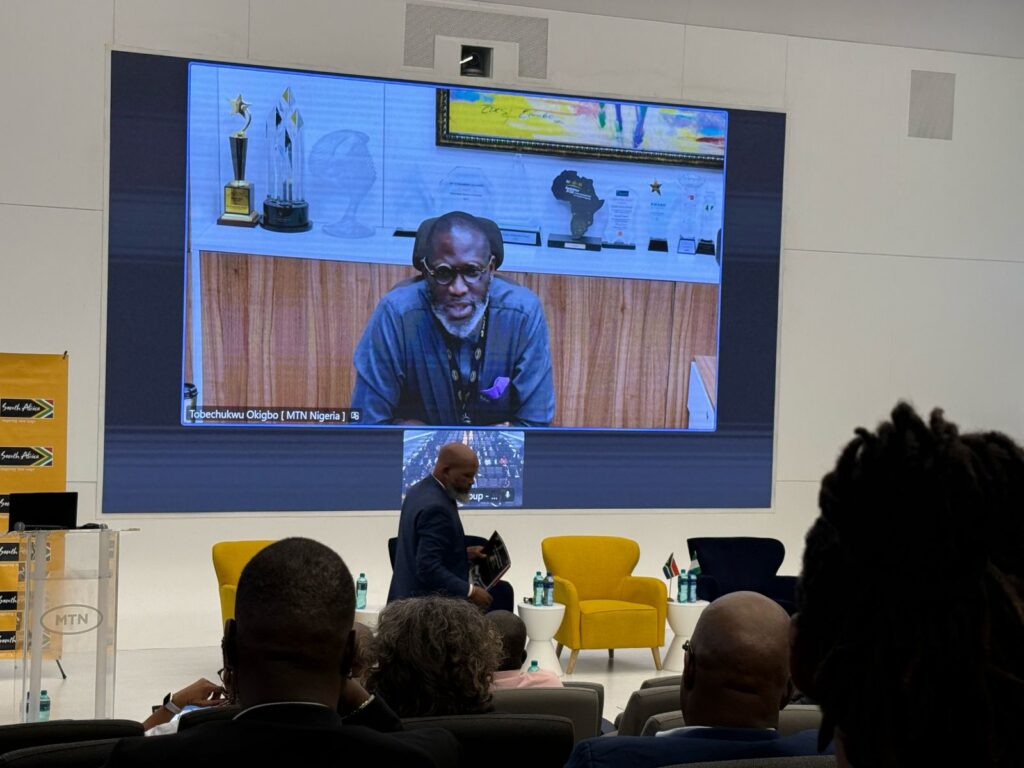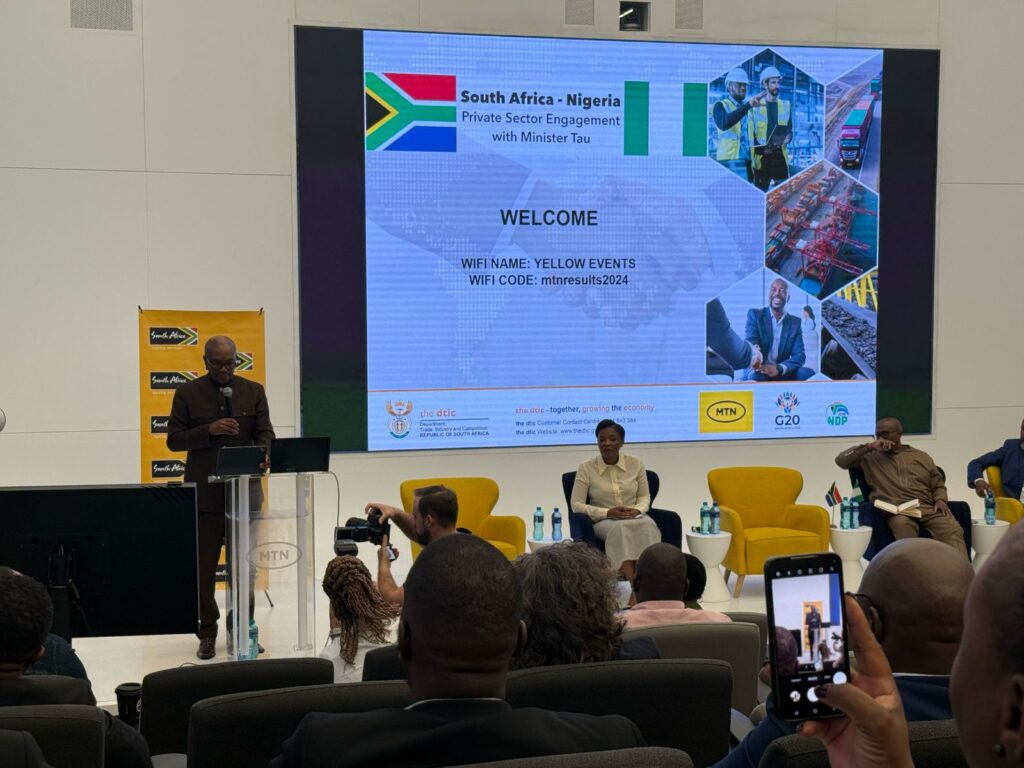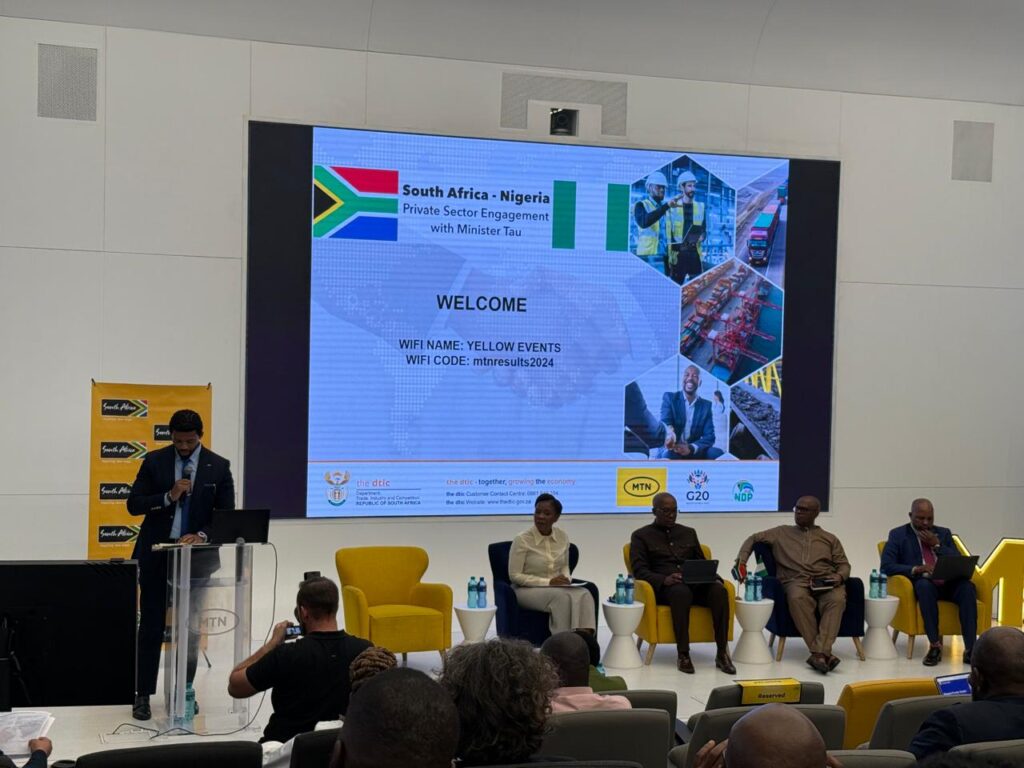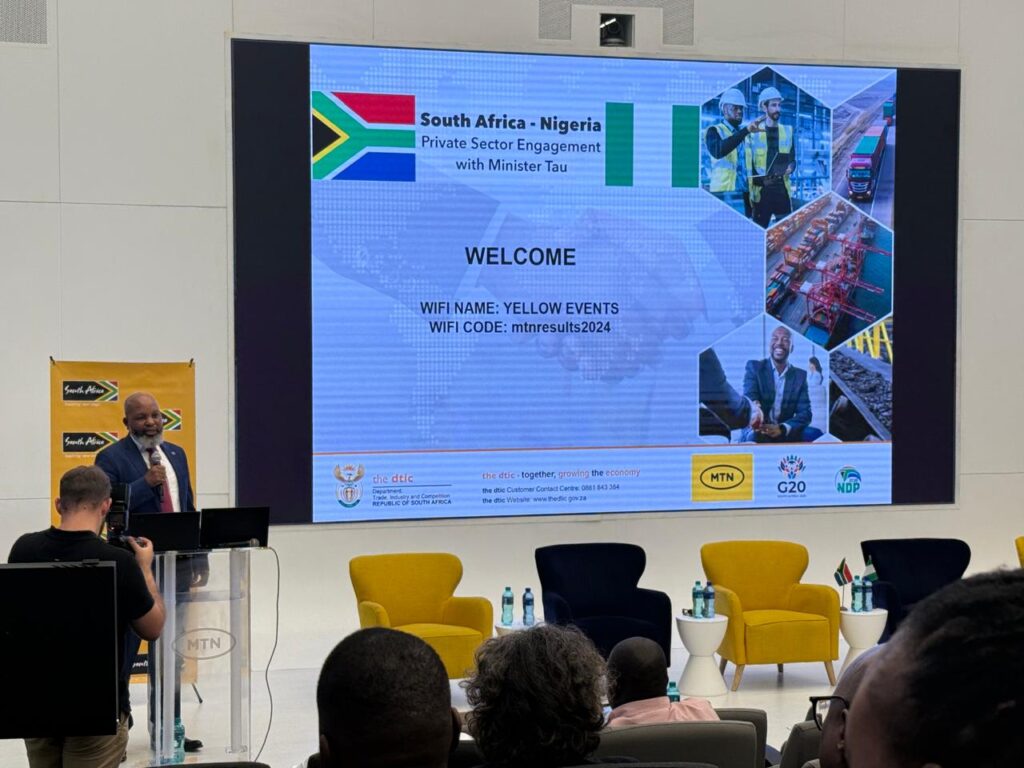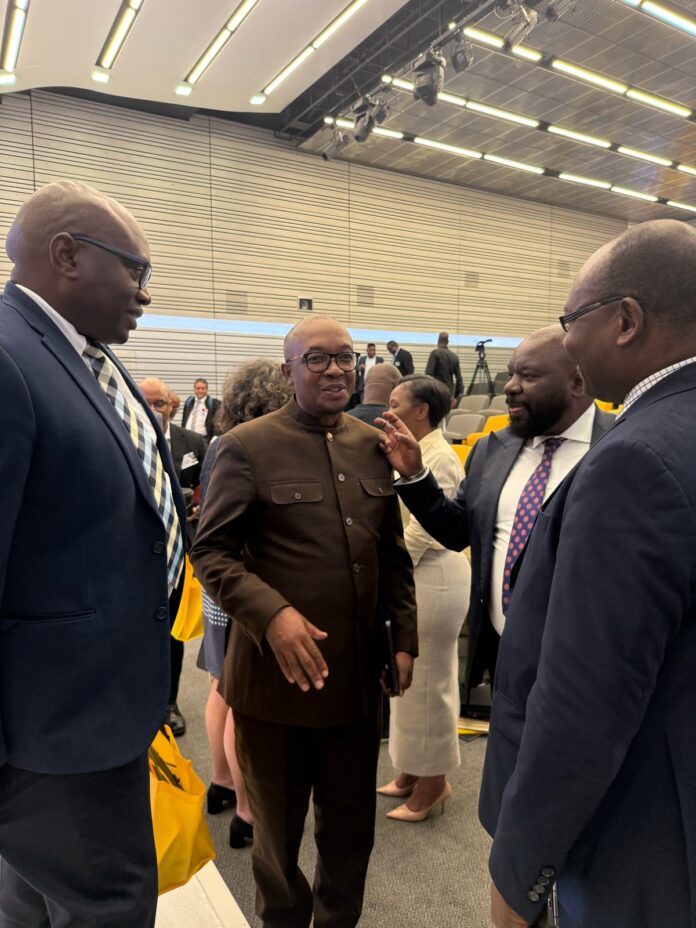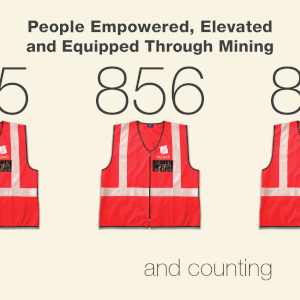Diplomatic Inside
The Department of Trade, Industry and Competition (the DTIC), in collaboration with MTN Group, hosted a high-level South Africa–Nigeria Private Sector Engagement Session on Wednesday at MTN’s Head Office in Roodepoort. The event brought together key business leaders and government officials in a strategic effort to deepen trade and investment relations between two of Africa’s largest economies.
Minister of Trade and Industry, Parks Tau, opened the session by emphasizing the timeliness of the engagement, following the successful 11th Binational Commission meeting held in December 2024 between South Africa and Nigeria. “The Binational Commission has served as a cornerstone of our strong bilateral relations,” said Tau. “Nigeria’s recently gazetted provisional schedule of tariff concessions under the African Continental Free Trade Area (AfCFTA), on 15 April 2025, is expected to significantly boost trade between our two countries.”
Tau highlighted that Nigeria remains South Africa’s foremost destination for exports, underpinned by its large population, rich natural resources, and potential for mutually beneficial value chain development. He underscored the importance of expanding cooperation under existing frameworks, such as the 2012 Memorandum of Understanding on Economic and Technical Cooperation.
While acknowledging the robust political and economic ties between the two nations, Minister Tau stressed the need to further diversify the trade basket. “In 2024, South Africa recorded a substantial trade deficit with Nigeria, largely due to oil and gas imports. It is crucial that we expand into new sectors to create a more balanced and sustainable economic partnership,” he said.
Tau identified the clean energy sector as a priority area for collaboration, citing the global energy transition as a unique opportunity for both countries to upgrade into technology-intensive value chains. “From electric vehicles and lithium batteries to renewable energy infrastructure, the potential for cooperation is vast,” he added.
However, the Minister also acknowledged challenges faced by South African businesses in Nigeria, such as market access barriers and non-tariff impediments. “Despite these challenges, trade and investment between our two nations have grown significantly since the post-apartheid era,” he noted.
The establishment of the Joint Ministerial Advisory Council on Industry, Trade, and Investment, launched during the 2021 state visit to Nigeria, was cited as a key step toward institutionalizing support for private sector initiatives and resolving cross-border trade challenges.
The roundtable aimed to gather insights from the private sector on trade and investment opportunities in Nigeria, discuss the challenges of doing business in both countries, and explore how government can better support the private sector’s regional ambitions.
Tau cited data from Nigeria’s National Bureau of Statistics, which revealed that the manufacturing sector’s contribution to nominal GDP in Q2 2022 stood at 12.97%, down from 14.18% in Q2 2021 and 15.06% in Q1 2022. He identified sectors such as food processing, cement, textiles, detergents, and beverages as key areas for joint value chain development.
Opportunities were also flagged in automotive manufacturing (including electric motorbikes), critical minerals (like lithium), pharmaceuticals, agriculture, and agri-processing.
Minister Tau also referred to discussions held on 15 April 2025 at the AfCFTA Council of Ministers meeting, where both nations reaffirmed their commitment to counter unilateral and protectionist trade measures. He emphasized the urgent need to prioritize the implementation of AfCFTA protocols, especially as global multilateral systems face increasing strain.
Key outcomes of the engagement included commitments to operationalize the Joint Ministerial Advisory Council, establish a Director-General’s platform, and resolve market access issues. Both governments also agreed to identify products for import duty waivers and launch joint projects in agriculture, infrastructure, and manufacturing. Minister Tau emphasized the need for concrete public-private initiatives to boost intra-African trade and deepen South Africa–Nigeria economic ties.
MTN CEO Reaffirms Commitment to South Africa–Nigeria Partnership and AfCFTA Vision
During the South Africa–Nigeria Private Sector Engagement Session held at MTN’s Head Office in Roodepoort on 30 April 2025, a representative of MTN read a message on behalf of MTN Group CEO Ralph Mupita, who was travelling to Lagos. In his remarks, Mupita expressed deep appreciation for the presence of South Africa’s Minister of Trade, Industry and Competition, Mr. Parks Tau, and emphasized MTN’s dedication to fostering stronger economic ties across the continent.
“On behalf of the MTN Group, Executive Committee and our CEO, it’s a true privilege to welcome you to MTN Nigeria and our Innovation Centre,” said the representative. Highlighting MTN’s roots across Africa, Mupita noted the responsibility that comes with being a major pan-African business. “Our presence today reflects not just our corporate commitment, but a profound belief that collaboration between business, government and nations is essential to unlocking Africa’s full potential.”
He emphasized that the African Continental Free Trade Area (AfCFTA) represents a historic opportunity to reshape Africa’s economic future, stressing that South Africa and Nigeria—Africa’s two largest economies—must play a leading role in advancing the agreement’s goals. Trade between the two countries reached R83 billion in 2024, showing promise but also signaling considerable potential for growth.
Mupita recalled the December 2024 state visit of Nigeria’s President to South Africa, where both leaders reaffirmed their commitment to deepening political, economic, and people-to-people relations. “Nigeria and South Africa see each other not as rivals, but as partners in advancing Africa’s destiny,” he said.
Reflecting on MTN’s own journey, Mupita said Nigeria holds a strategic place in the company’s history, having launched its largest mobile network there in 2001. MTN, he added, has been a vital contributor to bilateral relations between the two countries through investment, innovation, and job creation.
Looking ahead, Mupita reaffirmed MTN’s commitment to driving AfCFTA-aligned initiatives. “We are actively investing in cross-border digital financial services and building networks to empower entrepreneurs and create opportunities for millions,” he stated. He also called for a practical focus on infrastructure to complement AfCFTA’s policy goals, positioning MTN as a key enabler in that space.
In closing, Mupita thanked Minister Tau for his leadership and reiterated MTN’s readiness to work alongside both governments and private sector partners to realise the full potential of South Africa–Nigeria economic collaboration.
Games: SA-Nigeria Joint Council Identifies Key Business Obstacles, Pushes for Practical Reforms
Executive Director of the South African-Nigeria Chamber of Commerce, Dainna Games, said the Joint Ministerial Advisory Council on Industry, Trade and Investment has become a vital platform to improve trade and investment between Africa’s two largest economies by identifying practical obstacles and policy concerns that hinder private sector cooperation.
Speaking at a high-level roundtable hosted by South Africa’s Department of Trade, Industry and Competition (DTIC), Games noted that the council, established under the Binational Commission framework, began as a South African-led initiative in 2021 but gained momentum following Nigeria’s formal participation during a state visit in 2023.
“We’ve been working closely with government and private sector players over the last two years to identify the real challenges companies face doing business across our two markets,” she said, thanking DTIC and Standard Bank for their continued partnership and support.
Games highlighted eight priority sectors—manufacturing, energy, digital economy, tourism, automotive, agribusiness, infrastructure, and services—where stakeholders from both countries have discussed key “pain points” ranging from visa and permit difficulties to forex shortages, taxation issues, and logistics challenges, particularly around port inefficiencies.
“The cost of doing business in Nigeria, as well as unpredictable regulatory changes, remain major concerns,” she said, adding that South African companies often raise issues around forex repatriation and short-term visas, while Nigerian investors cite policy uncertainty in South Africa.
While acknowledging these hurdles, Games emphasized the constructive nature of the dialogue: “Even though we’ve outlined several negatives, the spirit of engagement has been overwhelmingly positive. Everyone is focused on unlocking opportunities and building trust.”
She underlined that soft issues—such as misinformation, historical mistrust, and the lack of people-to-people engagement—are harder to address but crucial for sustainable bilateral business ties.
“The roundtable is not just a talk shop—it is part of our effort to fast-track meaningful engagement now that both sides are officially on board,” she said.
